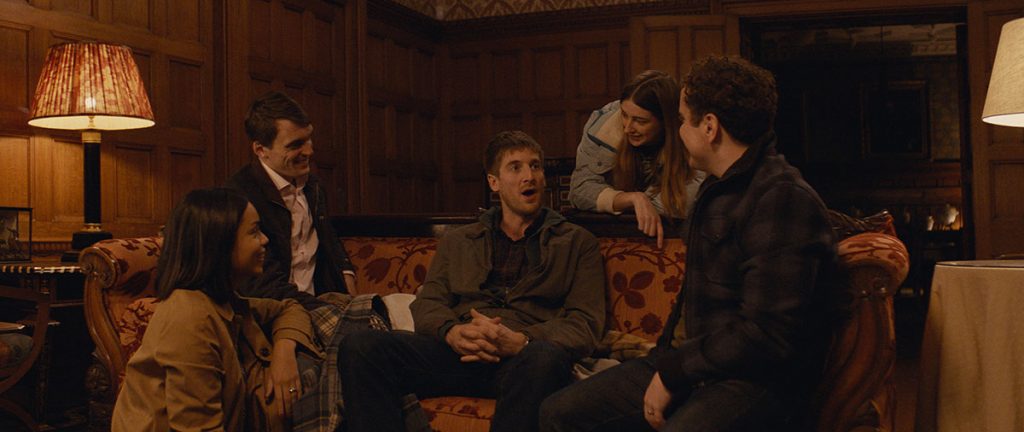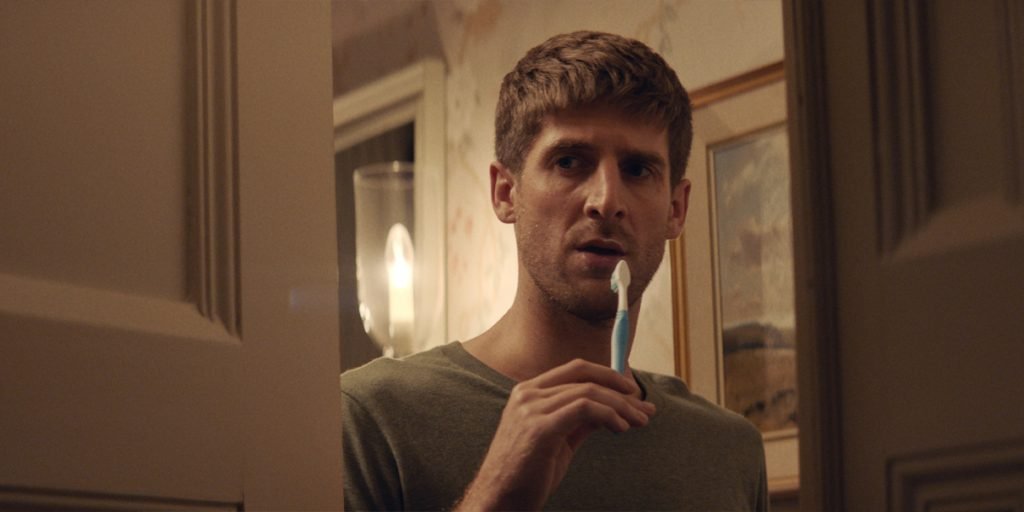All My Friends Hate Me is a deliciously disquieting, paranoia-fuelled social anxiety horror-comedy made even more hilarious and meaningful by how incredibly relatable it is.
If you’ve ever experienced social anxiety, you probably know what it’s like to be in a room full of people you’ve known for a lifetime and still feel like, behind their kind facade, they all secretly hate you. The progagonist of Andrew Gaynord’s (The Characters) All My Friends Hate Me is very familiar with that situation, having been invited to celebrate his birthday weekend at a remote country manor with old friends. Having recently returned from a trip abroad where he did charity work with refugees, Pete (About Time‘s Tom Stourton, who also co-wrote the screenplay with Tom Palmer) hasn’t seen his friends since university, and his birthday celebrations will serve not only as a reunion, but also as an occasion to introduce his girlfriend Sonia (Charly Clive, of Pure) to them, and eventually propose to her, when she joins them later that weekend.
But this walk down memory lane with his “not stereotypically posh” friends soon turns into a nightmare, when a series of equally unsettling and hilarious events begin to happen. And so, Pete’s friends suddenly seem more patronising than kind, and our confused protagonist feels more and more uncomfortable. “It’s all in your head,” his friends say, “Chill out. […] You’re just a bit anxious.” But Pete can’t shake the feeling that, underneath their condescending front, something else is going on. Are his friends turning against him, or is Pete just being paranoid? As the weirdness continues, the tension rises, and Pete feels even more alienated from a crowd whose jokes become more cruel and immature by the minute. Until a stranger joins them, and madness ensues.
All My Friends Hate Me is an impressive film. Not only is it the rare horror-comedy that absolutely nails the balance between horror and humour, but it is also a much-needed, incredibly effective analysis of social anxiety – a very real, universal issue affecting many of us. Who hasn’t been the target of a cruel joke, and reacted by laughing along while secretly feeling deflated and demoralized? Who hasn’t felt awkward and alone at a party, only to have their very real feelings minimised and dismissed as “paranoic” by insensitive, unempathetic friends? We’ve all found ourselves in Pete’s shows, and, as we recognise all the absurd, hilarious situations depicted in the film, not only do we laugh at the wonderful absurdity of it all, but we also instantly relate with a likeable, sensitive lead who embodies the best human values.
Part of the reason why the film works is Tom Stourton, who plays Pete as a genuinely nice, kind young man who wears his heart on his sleeve and insists on listening to his instincts. It’s thanks to Stourton’s committed performance that every single scene tugs at our emotions, whether it’s by laughing at a heartwarming montage of our hero dancing and singing along to The Dobbie Brothers’ “What A Fool Believes” in the film’s opening scene, by laughing hysterically at its most insane turns of events, or by feeling genuinely hurt when his friends gaslight him and make jokes at his expense. Like a character in itself, Pete’s social anxiety is everpresent, evident in the details, from contrite facial expressions and heightened reactions to overly kind text messages, awkward conversations and unnecessary apologies, and witnessing it on the screen deeply affects us, even if it’s through the lens of comedy.

In fact, the behaviour displayed by Pete’s friends is pretty much textbook material for what not to say and do in the presence of the socially anxious. Some of them are subtly condescendent, singling Pete out by constantly asking him if “he’s alright”; some don’t pay attention to what he has to say, and interrupt him as soon as he dares talking about himself on his birthday; some tease him for his charity work and imitate his Northern accent; some conceal insults within compliments. And then there’s those who take it upon themselves to inform him that he’s “not doing too well”, or that he’s “been a bit crap”, and those who call him selfish as soon as he starts being himself. There’s a whole lot of judgement, manipulation, narcisism, condescendence and passive aggressiveness in All My Friends Hate Me, a film whose every scene is so narratively and stylistically great that it manages to be not only meaningful and thought-provoking, but also hilarious, absorbing and fun, all at the same time.
If parallels were to be drawn between Gaynord’s film and other British comedy-horror movies, Hot Fuzz would immediately come to mind, as there’s a very specific kind of black humour in the film that is reminiscent of Edgar Wright‘s most acclaimed work, in the best possible way. But All My Friends Hate Me is also its own thing, and it demonstrates it with a script that has enough irony to be histerically fun, enough tension to keep us on our toes, enough emotion to be unexpectedly therapeautic, and memorable performances from all its wonderfully disquieting cast members. Not only that, but the film is also impressive on a technical level, with highly effective music (Joe Robbins and Will Lowes) and sound design (Barnaby Templer, of Unmade Beds), stunning cinematography (Ben Moulden, of The Drifters) and impeccable editing (Saam Hodivala) – even more so keeping in mind that the entire film was edited during the 2020 lockdown.
So, are Pete’s friends out to get him or is it all happening in his head? The film certainly answers this questions, and it does so by taking you for a thoroughly enjoyable ride that ultimately leaves you with an aftertaste, and rightly so. In our day and age, it’s refreshing to watch a film that depicts the nightmare that is social anxiety in an accurate, unapologetic way, and that, combined with the fact that All My Friends Hate Me also happens to be ironic, clever, darkly comic and fun, makes it an essential, recommended watch.
All My Friends Hate Me premiered at the Tribeca Film Festival on Friday, June 11, 2021 and is now available to watch on digital and on demand.

